 Manchester Terrier is originated from United Kingdom but Havapoo is originated from United States. Manchester Terrier may grow 8 cm / 3 inches shorter than Havapoo. Manchester Terrier may weigh 8 kg / 17 pounds lesser than Havapoo. Both Manchester Terrier and Havapoo has almost same life span. Both Manchester Terrier and Havapoo has almost same litter size. Manchester Terrier requires Low Maintenance. But Havapoo requires Moderate Maintenance
Manchester Terrier is originated from United Kingdom but Havapoo is originated from United States. Manchester Terrier may grow 8 cm / 3 inches shorter than Havapoo. Manchester Terrier may weigh 8 kg / 17 pounds lesser than Havapoo. Both Manchester Terrier and Havapoo has almost same life span. Both Manchester Terrier and Havapoo has almost same litter size. Manchester Terrier requires Low Maintenance. But Havapoo requires Moderate Maintenance
Basic Information
undefined
United Kingdom
United States
Life Span:
10 - 15 Years
10 - 14 Years
Other Names:
Gentleman's Terrier, the Manchester
Poovanese, Island Mini Doodle, Havadoodle, Havanesepoo, Havanesedoodle
Colors Available:
Black and Tan
brown, grey, tan, white, black
Coat:
Short and smooth
soft, hypoallergenic fur
Temperament:
Affectionate, Alert, Cheerful, Courageous, Curious, Energetic, Friendly, Gentle, Independent, Intelligent, Lively, Loving, Loyal, Outgoing, Playful, Protective, Quiet, Responsive, Social, Stubborn, Territorial
Affectionate, Energetic, Friendly, Gentle, Intelligent, Loving, Outgoing, Playful
Grooming:
Low Maintenance
Moderate Maintenance
New Owners Friendly:
Yes
Yes
History
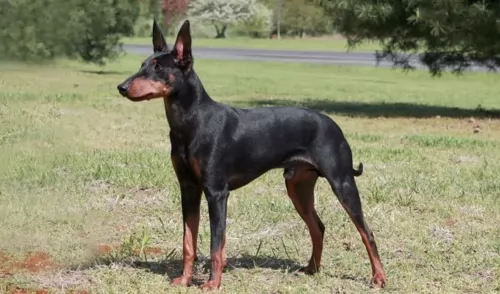 Looking much like the Black and Tan Terrier, the Manchester Terrier is a dog that was actually developed from the Black and Tan, which is the oldest known breed of terrier.
Looking much like the Black and Tan Terrier, the Manchester Terrier is a dog that was actually developed from the Black and Tan, which is the oldest known breed of terrier.
In the United States there are 2 varieties of the Manchester Terrier — the Toy and the Standard but in the UK the 2 sizes are classified as different breeds - the English Toy Terrier and the Manchester Terrier.
The dog was first bred in the 19th century to wipe out rats and mice, originating from Manchester, England. This is an old dog breed, gaining the nickname of the Gentleman's Terrier because of its dignified looks and personality.
After the 2nd World War, the numbers of the dog dropped and this spurred the kennel club to list it as a vulnerable native breed, in danger of extinction. It was in 1937 that the British Manchester Terrier Club was formed.
The Havapoo is usually a cross with a miniature Poodle and a Havanese but other poodle sizes such as the toy can be used. This is a fairly new cross breed just getting the attention of the American public. The result is a friendly, small dog. They have a striking appearance and lovable personality. They are easy to train and very smart. Not much is know about their heritage except that they were developed in the United States sometime in the past 30 years. Given the long history of the parental breeds, you can count on the quality and beauty of the Havapoo.
Description
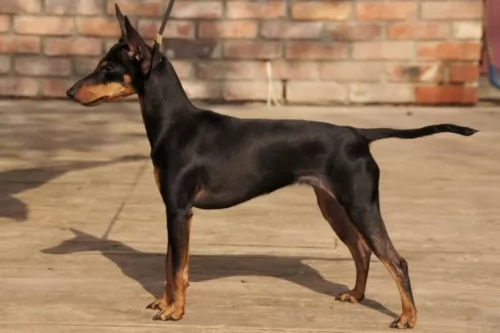 The Manchester Terrier is a small, smooth haired dog with a black and tan coat and a head with a fairly long muzzle, small bright eyes, largish erect ears and a deep chest.
The Manchester Terrier is a small, smooth haired dog with a black and tan coat and a head with a fairly long muzzle, small bright eyes, largish erect ears and a deep chest.
The body is lean and muscular and the tail, where once docked, now tends to be left long. In the toy sized dog you will find him standing at roughly 25 – 30cm in height and he will weigh between 2 to 4kg. The standard sized dog will be slightly taller and heavier and weigh in the region of 8kg.
You can expect between 2 – 4 puppies from a breeding pair.
Temperament:
Feisty, energetic, alert and intelligent are some of the words which describe the Manchester Terrier. Like any other dog, training and socialization will make him a splendid pet, obedient and amicable among people.
He is loving and loyal, courageous and feisty and guaranteed to make you an eager-to-please pet. He can adapt to life in the city or countryside, but is going to need plenty of exercise wherever you keep him as a pet.
The look of the Havapoo is unpredictable in first generation mixes as the puppies can appear like either of the parents. Most however have carried on the facial features of the Havanese. They usually have soft coats with hypoallergenic fur that comes in brown, black, grey, white and tan.
The white dogs tend to be deaf or perhaps even blind.
They are really good looking dogs whichever parent they favor.
Characteristics
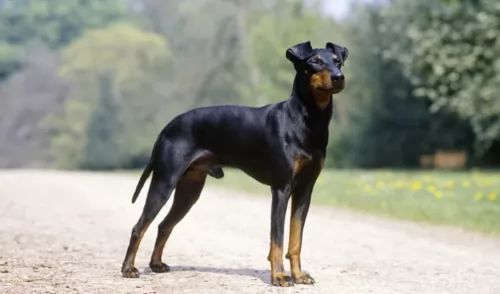 The Manchester Terrier has so many good qualities that make him such a good pet. Low maintenance, he is clean and well groomed to look at. He is also a healthy dog breed, nice and active and low maintenance.
The Manchester Terrier has so many good qualities that make him such a good pet. Low maintenance, he is clean and well groomed to look at. He is also a healthy dog breed, nice and active and low maintenance.
This little dog is willing to come into your home and heart. He will make you a wonderful pet and friend for as long as 15 years if you take special care of him.
1Children friendliness yes but monitor their interaction so the dog does not get hurt.
2.Special talents highly intelligent and love to run
3.Adaptability Home or apartment is fine but would love a fenced yard to run in.
4.Learning ability very high smart and loves to learn
Health Problems
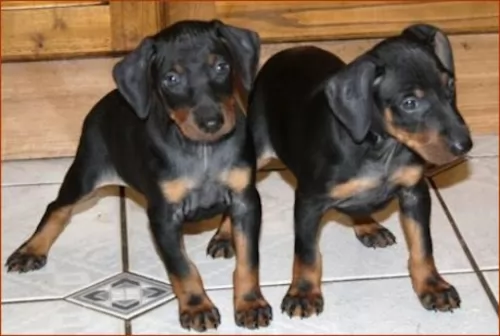 This dog breed is fairly healthy and can reach a good age if looked after well. Every dog though, can be affected by a number of inheritable genetic disorders.
This dog breed is fairly healthy and can reach a good age if looked after well. Every dog though, can be affected by a number of inheritable genetic disorders.
Glaucoma is a common genetic condition in Terrier breeds, including the Manchester Terrier. Secondary glaucoma, which is known as lens luxation is brought about when there is excessive pressure in the eyeball. The lens of the eye is put out of alignment. Most times surgery is the solution.
Von Willebrand's Disease is a blood disorder that affects the clotting process. A dog with this disease will have bleeding gums, continuous bleeding after surgery and sometimes blood in the stool. It’s a disease which can’t be cured but it can be managed with treatments.
Even though first generation mixes have no genetic health issues. There are however some issues they are prone to:
• Deafness - primarily in the white dogs, nothing can be done for it.
• Cataracts – can lead to blindness
• Hypothyroidism – can be medicated
• Hip Dysplasia – can lead to lameness
• Patellar Luxation – can lead to lameness
Caring The Pet
Grooming:
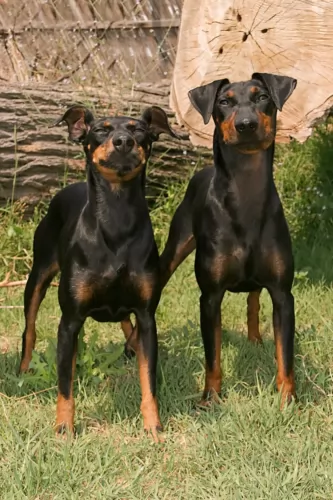 Low maintenance, the Manchester Terrier will only require a brushing once or twice a week. Check his eyes and ears for infections, clip his nails and brush his teeth 2 or 3 times a week.
Low maintenance, the Manchester Terrier will only require a brushing once or twice a week. Check his eyes and ears for infections, clip his nails and brush his teeth 2 or 3 times a week.
Diet:
The Manchester Terrier is a lean, muscular dog and you want to be sure to keep him that way. If you feed him commercially manufactured food, make sure that it is one of the high quality brands – food which is packed full of vitamins and minerals to ensure the health of your dog.
Any packaged food you buy should be appropriate to the dog’s age and his activity levels. You won’t be doing your dog a favor by feeding him treats that you enjoy such as chocolate, coffee, peanuts, raisins, grapes and onions.
Dogs want simple food that don’t change much. Keeping things simple prevents upset stomachs. Give him some wholesome home-made food occasionally to add into his dry kibble. This can be boiled chicken, brown rice or pasta and some cooked or raw vegetables such as potatoes, carrots and spinach. Some raw meat added in from time to time can also do wonders for your dog. Make sure he has access around the clock to fresh, cool water.
Exercise:
The Manchester Terrier wants lots of exercise, and apart from him having his regular daily walks, he will need runs off the leash in the park. If you go cycling for instance, he will readily run beside you.
1Feeding the puppy – feed a high quality puppy food for small or toy dogs. Feed 3-4 times a day a total or 1 cup.
2.Feeding the adult - feed a high quality puppy food for small or toy dogs. Feed 3-4 times a day a total of 2 cups
3.Points for Good Health – overall good health
4. Games and Exercises – needs some moderate exercise and would love a fenced yard to run in. Will play fetch and some are good at agility.
Comparison with other breeds
- Manchester Terrier vs English Bulldog - Breed Comparison
- Manchester Terrier vs German Shepherd - Breed Comparison
- Manchester Terrier vs Golden Retriever - Breed Comparison
- Manchester Terrier vs Labrador Retriever - Breed Comparison
- Manchester Terrier vs West Highland White Terrier - Breed Comparison
- Manchester Terrier vs French Bulldog - Breed Comparison
- Manchester Terrier vs Beagle - Breed Comparison
- Manchester Terrier vs Yorkshire Terrier - Breed Comparison
- Manchester Terrier vs Poodle - Breed Comparison
- Manchester Terrier vs Rottweiler - Breed Comparison
- Manchester Terrier vs Boxer - Breed Comparison
- Manchester Terrier vs English Pointer - Breed Comparison
- Manchester Terrier vs Siberian Husky - Breed Comparison
- Manchester Terrier vs Doberman Pinscher - Breed Comparison
- Manchester Terrier vs American Bully - Breed Comparison
- Manchester Terrier vs Abruzzenhund - Breed Comparison
- Manchester Terrier vs Affenpinscher - Breed Comparison
- Manchester Terrier vs Afghan Hound - Breed Comparison
- Manchester Terrier vs Aidi - Breed Comparison
- Manchester Terrier vs Airedale Terrier - Breed Comparison
- Manchester Terrier vs Akbash Dog - Breed Comparison
- Manchester Terrier vs Akita - Breed Comparison
- Manchester Terrier vs Africanis - Breed Comparison
- Manchester Terrier vs Askal - Breed Comparison
- Manchester Terrier vs Atlas Terrier - Breed Comparison
- Havapoo vs English Bulldog - Breed Comparison
- Havapoo vs German Shepherd - Breed Comparison
- Havapoo vs Golden Retriever - Breed Comparison
- Havapoo vs Labrador Retriever - Breed Comparison
- Havapoo vs West Highland White Terrier - Breed Comparison
- Havapoo vs French Bulldog - Breed Comparison
- Havapoo vs Beagle - Breed Comparison
- Havapoo vs Yorkshire Terrier - Breed Comparison
- Havapoo vs Poodle - Breed Comparison
- Havapoo vs Rottweiler - Breed Comparison
- Havapoo vs Boxer - Breed Comparison
- Havapoo vs English Pointer - Breed Comparison
- Havapoo vs Siberian Husky - Breed Comparison
- Havapoo vs Doberman Pinscher - Breed Comparison
- Havapoo vs American Bully - Breed Comparison
- Havapoo vs Abruzzenhund - Breed Comparison
- Havapoo vs Affenpinscher - Breed Comparison
- Havapoo vs Afghan Hound - Breed Comparison
- Havapoo vs Aidi - Breed Comparison
- Havapoo vs Airedale Terrier - Breed Comparison
- Havapoo vs Akbash Dog - Breed Comparison
- Havapoo vs Akita - Breed Comparison
- Havapoo vs Africanis - Breed Comparison
- Havapoo vs Askal - Breed Comparison
- Havapoo vs Atlas Terrier - Breed Comparison
 Petzlover
Petzlover Manchester Terrier is originated from United Kingdom but Havapoo is originated from United States. Manchester Terrier may grow 8 cm / 3 inches shorter than Havapoo. Manchester Terrier may weigh 8 kg / 17 pounds lesser than Havapoo. Both Manchester Terrier and Havapoo has almost same life span. Both Manchester Terrier and Havapoo has almost same litter size. Manchester Terrier requires Low Maintenance. But Havapoo requires Moderate Maintenance
Manchester Terrier is originated from United Kingdom but Havapoo is originated from United States. Manchester Terrier may grow 8 cm / 3 inches shorter than Havapoo. Manchester Terrier may weigh 8 kg / 17 pounds lesser than Havapoo. Both Manchester Terrier and Havapoo has almost same life span. Both Manchester Terrier and Havapoo has almost same litter size. Manchester Terrier requires Low Maintenance. But Havapoo requires Moderate Maintenance Looking much like the Black and Tan Terrier, the Manchester Terrier is a dog that was actually developed from the Black and Tan, which is the oldest known breed of terrier.
Looking much like the Black and Tan Terrier, the Manchester Terrier is a dog that was actually developed from the Black and Tan, which is the oldest known breed of terrier. The Manchester Terrier is a small, smooth haired dog with a black and tan coat and a head with a fairly long muzzle, small bright eyes, largish erect ears and a deep chest.
The Manchester Terrier is a small, smooth haired dog with a black and tan coat and a head with a fairly long muzzle, small bright eyes, largish erect ears and a deep chest. The Manchester Terrier has so many good qualities that make him such a good pet. Low maintenance, he is clean and well groomed to look at. He is also a healthy dog breed, nice and active and low maintenance.
The Manchester Terrier has so many good qualities that make him such a good pet. Low maintenance, he is clean and well groomed to look at. He is also a healthy dog breed, nice and active and low maintenance. This dog breed is fairly healthy and can reach a good age if looked after well. Every dog though, can be affected by a number of inheritable genetic disorders.
This dog breed is fairly healthy and can reach a good age if looked after well. Every dog though, can be affected by a number of inheritable genetic disorders. Low maintenance, the Manchester Terrier will only require a brushing once or twice a week. Check his eyes and ears for infections, clip his nails and brush his teeth 2 or 3 times a week.
Low maintenance, the Manchester Terrier will only require a brushing once or twice a week. Check his eyes and ears for infections, clip his nails and brush his teeth 2 or 3 times a week.